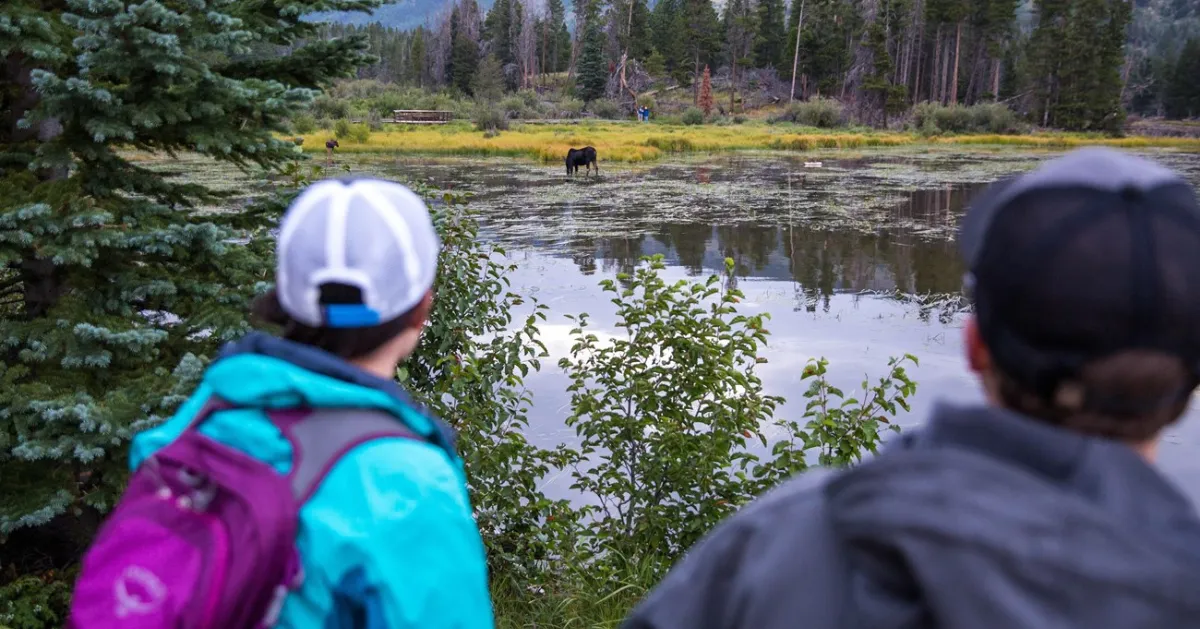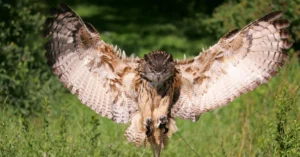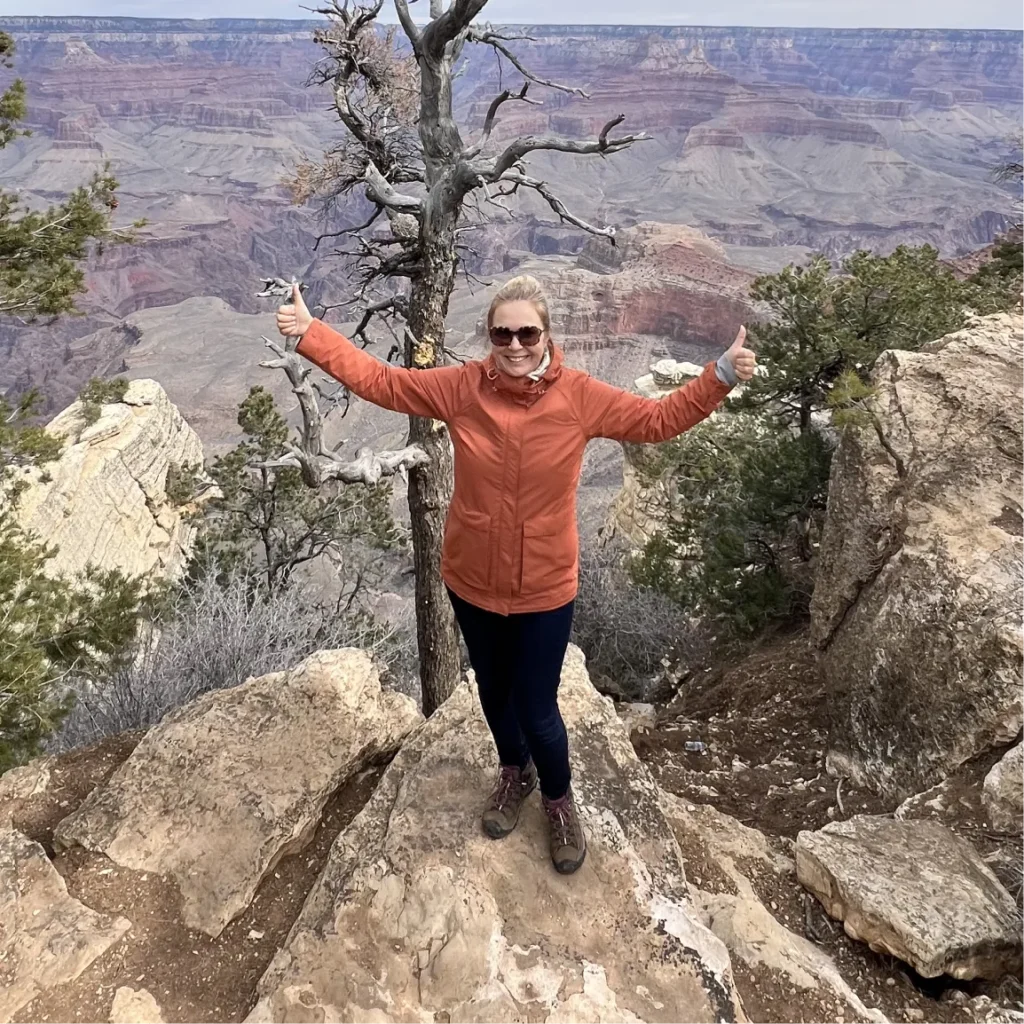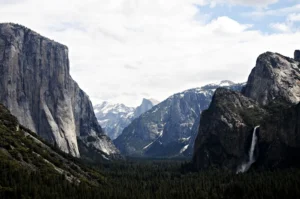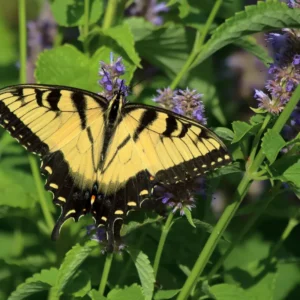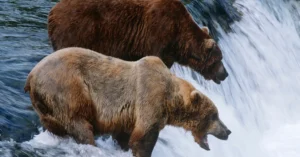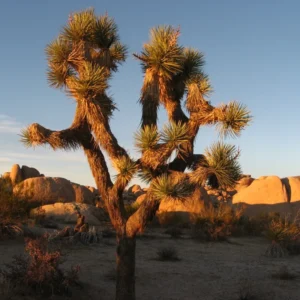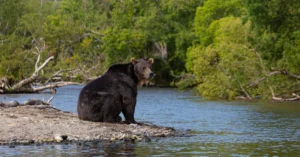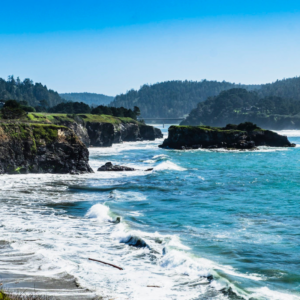American wildlife watching is a fun and easy activity. You can see many animals in their natural homes. Watching wildlife teaches you about nature.
It’s exciting to see animals in their natural surroundings. In this blog, we will talk about American wildlife animals. We will also tell you the best places to watch them.
Wyoming has stayed wilder than most other U.S. states. It offers great chances to see wildlife. Yellowstone National Park is a top spot. It has the highest concentration of mammals in the lower 48 states.
You can see bison, elk, and bears there. Keep reading to learn more about these amazing animals and the best places to watch them in action.
1. Elk
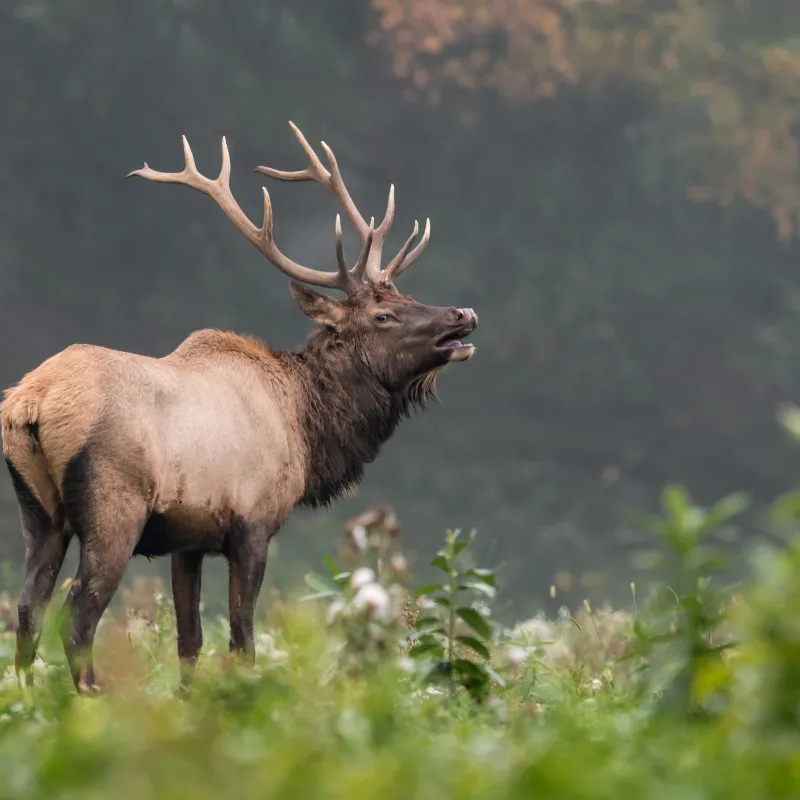
- Best Elk Watching Destination: Wyoming’s National Elk Refuge
- Best Season: Spring and Summer
Elks are large and majestic animals. They live in herds and are known for their strong and calm demeanor. They inhabit forests and meadows, enjoying a diet of grasses, leaves, and bark.
Elks migrate seasonally, covering vast areas of land. They are social animals and can be seen grazing together in open fields.
Wyoming’s National Elk Refuge is home to the Jackson elk herd. This herd has over 11,000 elks. They migrate through Grand Teton National Park, Yellowstone National Park, and Bridger-Teton National Forest.
Early morning and late evening are the best times to see them. Most elks in Smoky Mountain National Park are in the Cataloochee area.
Safety Tips
- Enjoy elk from a distance using binoculars or a spotting scope.
- Do not approach the elks.
- Stay quiet and avoid sudden movements.
- Follow park rules and respect their habitat.
2. American Alligator
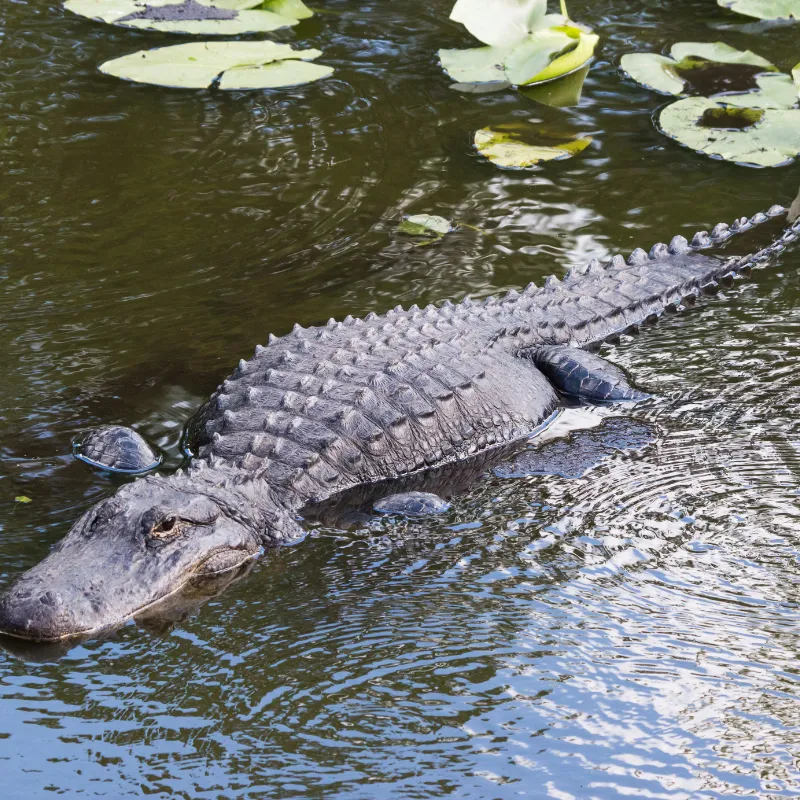
- Best Alligator Watching Destination: Everglades National Park, Florida
- Best Season: Dry Season
The American alligator, also called a gator, is a large crocodilian reptile. They are native to the Southeastern United States. Gators have strong bodies, powerful tails, and sharp teeth.
They live in freshwater environments like swamps, marshes, and rivers. Alligators are carnivores and feed on fish, birds, and small mammals.
Everglades National Park in Florida is the best place to watch American alligators. The park is home to over 2,000 alligators. It offers well-narrated boat tours and alligator shows.
You can also enjoy other animal encounters. The dry season is the best time to visit this eco-wonderland.
Safety Tips
- Observe alligators from a safe distance.
- Do not feed or approach them.
- Stay on designated paths and boat tours.
- Follow all park rules and guidelines.
3. Bald Eagle
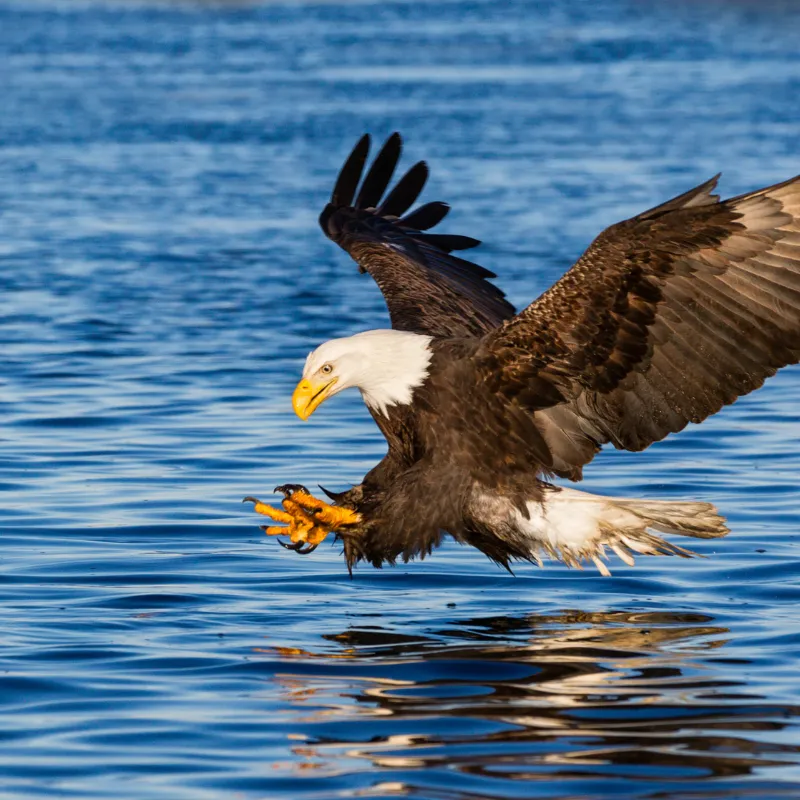
- Best Bald Eagle Watching Destination: Acadia National Park, Maine
- Best Season: Winter (December to February)
Bald eagles are majestic birds of prey. They thrive along the coast of Maine, especially in Acadia National Park.
These eagles are usually found near water, where they feed and nest in large trees. Females, the larger of the species, lay one to three eggs between February and April. Both adults keep the eggs warm.
Acadia National Park is nestled into the rugged Maine coastline. It is home to seabirds, birds of prey, and boreal birds. The park provides a perfect habitat for bald eagles.
You can often spot them soaring above the trees or perched near the water. Winter is an ideal time to see these magnificent birds, as they are easier to spot between December and February.
Safety Tips
- Watch bald eagles from a distance.
- Use binoculars for a closer look.
- Do not disturb their nesting sites.
- Follow park rules and guidelines.
4. Bison
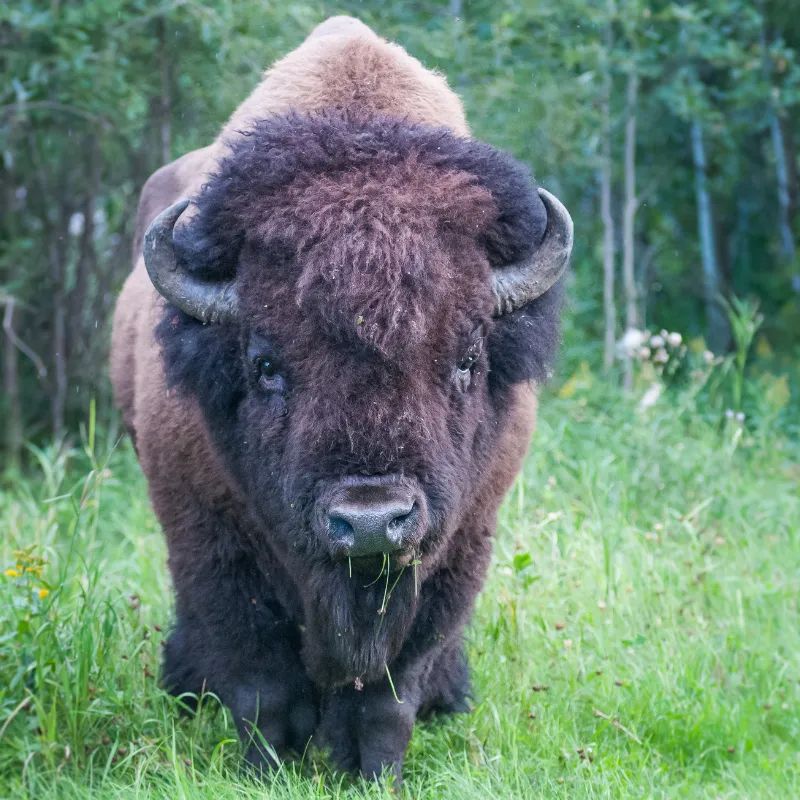
- Best Bison Watching Destination: Yellowstone National Park, Wyoming
- Best Season: Spring
Bison are large, powerful animals. They are often found in the grassy valleys of Yellowstone National Park, especially in the Hayden Valley. Historically, Yellowstone bison roamed over 7,720 square miles in the headwaters of the Yellowstone and Madison rivers.
Today, their range is mostly within Yellowstone National Park and some areas of Montana. Bison migrate with the seasons, grazing as they move.
Yellowstone National Park is the best place to watch bison. Theodore Roosevelt National Park is another popular location. In Yellowstone, you can see bison in their natural habitat, grazing and moving through the park.
Spring is the best time to watch them, as they leave their winter ranges and follow the green wave of new growth.
Safety Tips
- Observe bison from a safe distance.
- Stay in your vehicle if you see them on the road.
- Do not approach or feed the bison.
- Follow park rules and guidelines.
5. Manatee
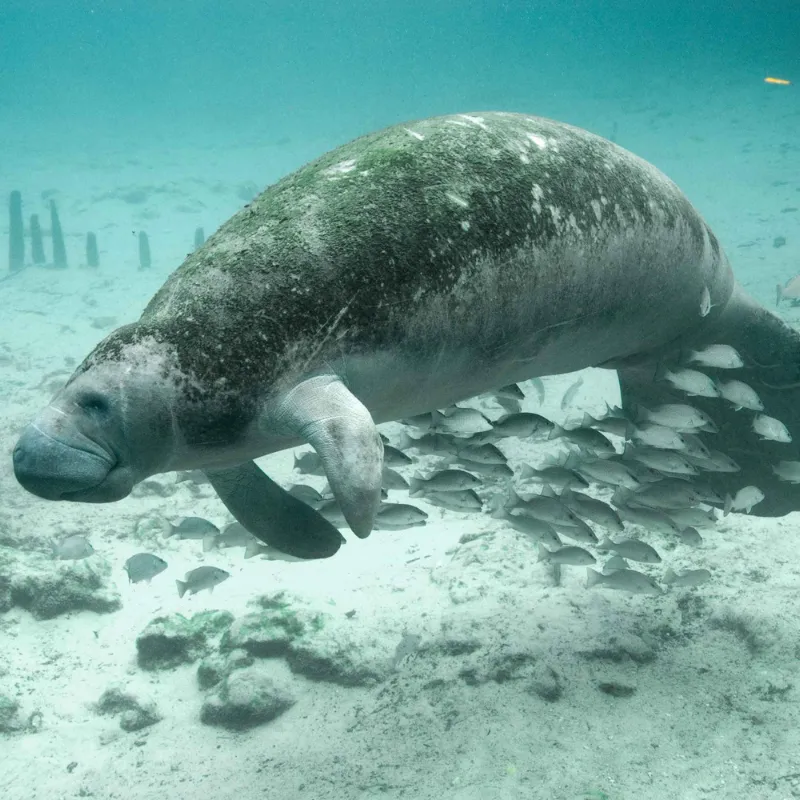
- Best Manatee Watching Destination: Tarpon Springs, Florida
- Best Season: Manatee Season (November 15th – March 31st)
Manatees are gentle, slow-moving mammals. They live in warm water springs across Florida.
These large creatures spend up to eight hours a day grazing on seagrass. Manatees are known for their calm demeanor and are often found in groups.
Tarpon Springs, Florida, is a hidden gem for manatee watching. Located about 45 minutes from Tampa, this area is famous for sponge fishing and manatees.
During the winter months, many manatees gather here. On weekends, you can paddle with them in a clear kayak, offering an unforgettable experience.
Safety Tips
- Observe manatees from a respectful distance.
- Use a clear kayak for better views without disturbing them.
- Do not touch or feed the manatees.
- Follow local rules and guidelines.
6. Grizzly Bear
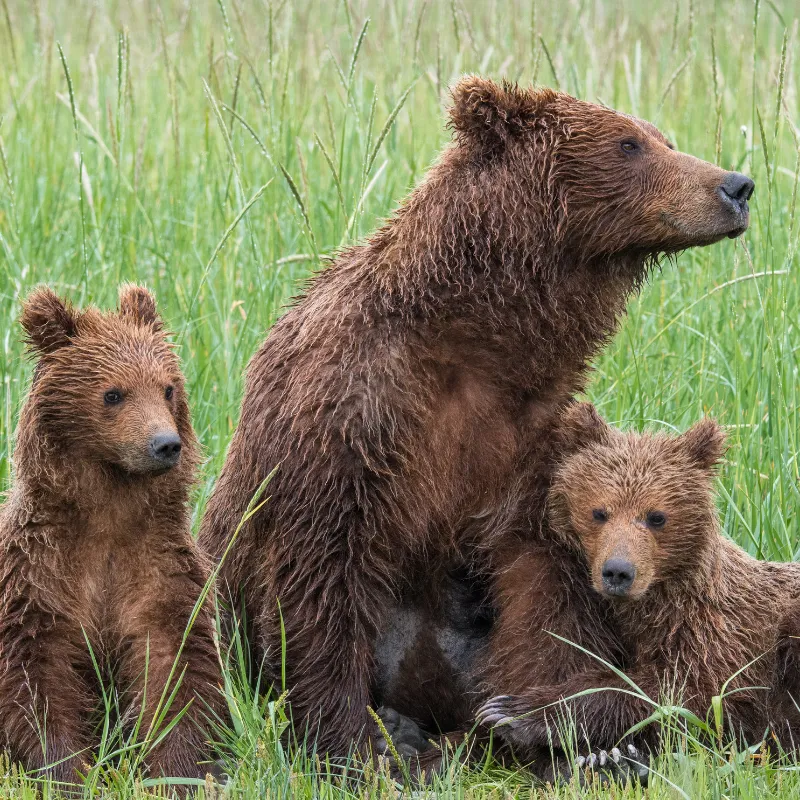
- Best Grizzly Bear Watching Destination: Katmai and Denali National Parks, Alaska
- Best Season: Summer and Fall
Grizzly bears are large, powerful animals. They can weigh up to 600 kilos. These bears are very intelligent and can learn how to get food from humans. Grizzly bears are best known for hunting salmon in rivers.
They live in various national parks, with Katmai and Denali National Parks being top locations to see them.
Katmai National Park is famous for Brooks Falls. Here, you can watch brown bears hunt salmon every year in the Brooks River.
Viewing platforms offer a great way to observe these bears and their special behavior. Denali National Park is another excellent spot to see grizzly bears in their natural habitat.
Safety Tips
- Observe grizzly bears from a safe distance.
- Do not approach or feed the bears.
- Stay on designated paths and follow park rules.
- Carry bear spray and know how to use it.
7. Pronghorn Antelope
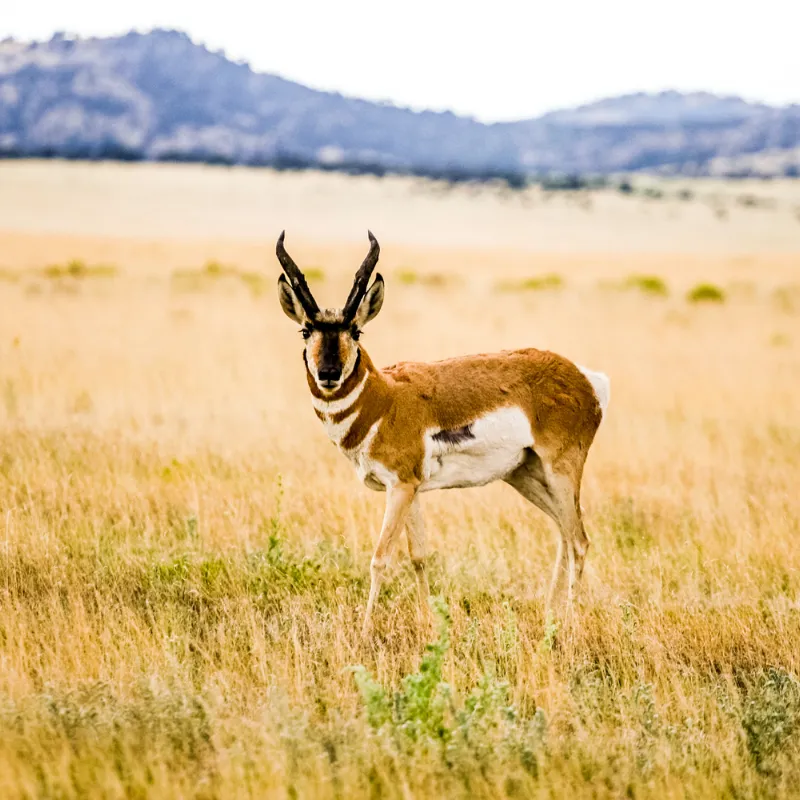
- Best Pronghorn Watching Destination: Red Desert and Yellowstone Ecosystems, Wyoming
- Best Season: Summer and Winter
Pronghorn antelopes are unique to North America. They are known for their speed, being the second fastest land animals.
Pronghorns have strong vision, which they use to communicate. They migrate between feeding grounds in summer and winter to survive the harsh seasons.
The Sonoran pronghorn is a smaller subspecies, with only about 160 free-ranging individuals left in the U.S.
The highest numbers of pronghorn can be found in Wyoming, particularly in the Red Desert and Yellowstone ecosystems. These areas provide excellent opportunities to see pronghorn in their natural habitat.
Safety Tips
- Observe pronghorn from a safe distance.
- Use binoculars for better views.
- Do not approach or feed the pronghorn.
- Follow park rules and guidelines.
8. Bighorn Sheep
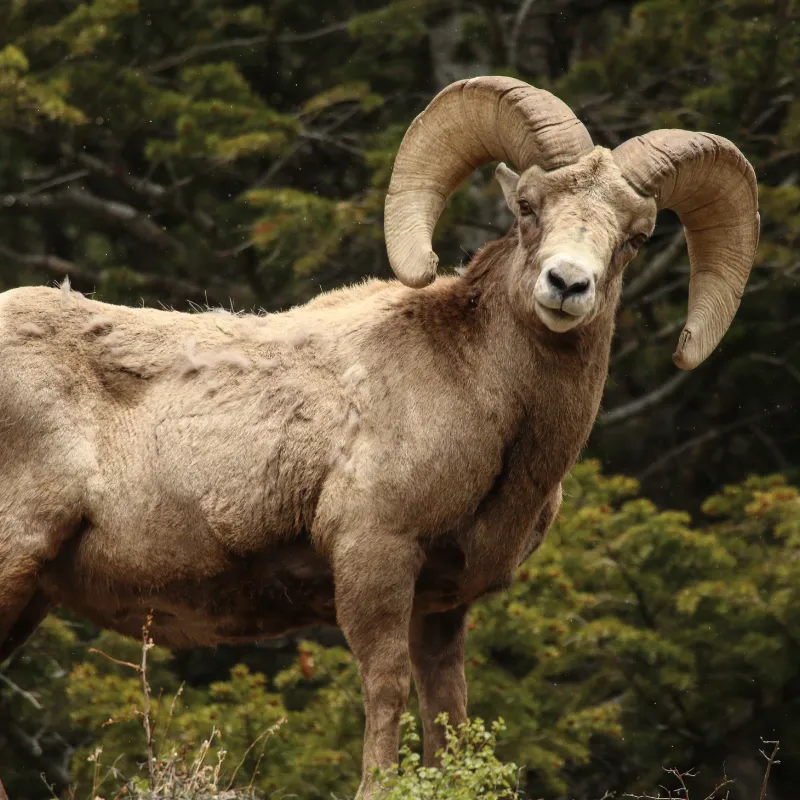
- Best Bighorn Sheep Watching Destination: Rocky Mountain National Park, Colorado
- Best Season: Late Spring and Early Summer
Bighorn sheep are the iconic symbol of the Rocky Mountains. They have lived in the area for a long time, especially in and around Rocky Mountain National Park.
These sheep are very sensitive to human presence, more so than many other animals in the park. Bighorn sheep are known for their impressive curved horns and strong climbing abilities.
During late spring and early summer, you can often find bighorn sheep in the Horseshoe Park area at Sheep Lakes.
Besides the Rocky Mountains, they can also be seen in Desert National Wildlife Refuge and Valley of Fire State Park. These locations provide great opportunities to observe bighorn sheep in their natural habitats.
Safety Tips
- Observe bighorn sheep from a safe distance.
- Use binoculars for closer views.
- Do not approach or feed the sheep.
- Follow park rules and guidelines.
9. Ring Tail
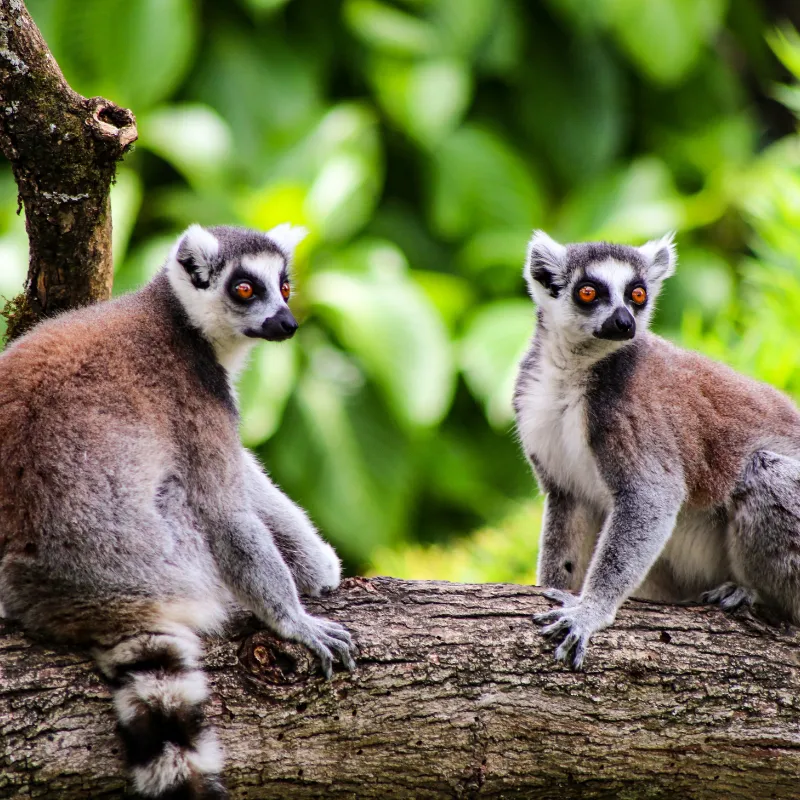
- Best Ringtail Watching Destination: Zion National Park, Utah
- Best Season: Year-Round
Ringtails are elusive creatures, known for their long tails with alternating bands of white and black fur.
These animals are excellent climbers, able to ascend vertical walls, trees, rocky cliffs, and even cacti. As nocturnal animals, they have excellent eyesight and hearing, which help them hunt at night.
Ringtails prefer rocky habitats near water. Zion National Park is a prime location to find them.
The cracks and crevices in the rock layers of Zion provide ample opportunities for ringtails to use their agility. They hunt insects, lizards, and small mammals in this rugged terrain.
Safety Tips
- Observe ringtails from a safe distance.
- Use a flashlight with a red filter to avoid disturbing them at night.
- Do not approach or feed the ringtails.
- Follow park rules and guidelines.
10. American Flamingo
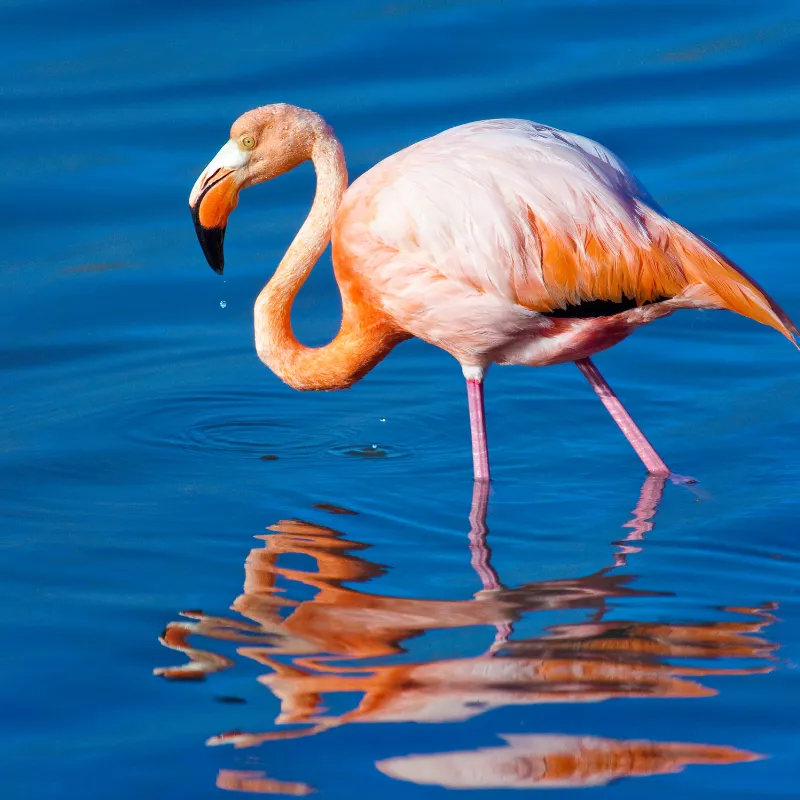
- Best Flamingo Watching Destination: Everglades National Park, Florida
- Best Season: Winter (November to March)
American flamingos are striking birds known for their bright pink feathers, long necks, and slender legs. These birds are social creatures and often seen in large flocks.
They feed on algae, small fish, and invertebrates, which they filter out of the water with their specialized beaks. Flamingos get their pink color from the carotenoid pigments in their diet.
Everglades National Park in Florida is one of the best places to watch American flamingos.
The park’s vast wetlands and shallow waters provide an ideal habitat for these birds. During the winter months, from November to March, you can see large flocks of flamingos wading and feeding in the water.
Safety Tips
- Observe flamingos from a safe distance to avoid disturbing them.
- Use binoculars for closer views.
- Stay on designated paths and follow park rules.
- Do not approach or feed the flamingos.
End Note
American wildlife watching is a wonderful activity. You can see amazing animals like elk, alligators, bald eagles, bison, pronghorn antelope, grizzly bears, bighorn sheep, ringtails, and flamingos.
Each animal has unique habits and habitats. Visiting national parks and wildlife refuges offers the best chance to see them in their natural environments.
Always follow safety tips while watching wildlife. Keep a safe distance, use binoculars, and respect their habitats.
By doing this, you ensure a safe and enjoyable experience for both you and the animals. Enjoy your adventure in American wildlife watching and make memories that will last a lifetime.

